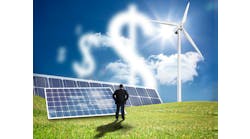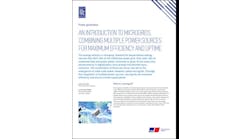Massachusetts is looking for innovative ideas to shore up gas station resiliency as part of its wider effort to boost clean energy.
Credit: FEMA
The Massachusetts Clean Energy Center (MassCEC) is seeking expressions of interest — a precursor to a funding offer — for demonstration projects that can help keep the lights on at gas stations during power outages.
Hurricane Katrina, Superstorm Sandy and other disasters revealed the electric vulnerability of gas stations, with many unable to operate, in some cases leading to gasoline rationing.
“We do see service stations as privately owned, critical infrastructure,” said Galen Nelson, MassCEC’s senior director of innovation and industry support. “They provide refueling for the general public, police fire, rescue, national guard perhaps, as well as utility crews.”
Service stations with convenience stores add the additional benefits of offering supplies and food and possibly electric charging for cell phones and other devices during a power outage.
The request for information (RFI) seeks projects that offer measurable energy resilience, risk management, and clean energy or climate benefits to Massachusetts.
Nelson said that the state will be technology agnostic in selecting projects. “We are wide open. We want to see what the market will offer.”
The idea is to draw “solutions that provide benefits” whether they use combined heat and power, fuel cells, solar plus storage, energy efficiency, demand management or some other approach, he said. The state also is interested in projects with an electric vehicle charging component.
“We will be looking to the market actors to approach us with different concepts,” he said.
In addition, the RFI seeks innovative, replicable business and ownership models. “It may make the most sense, for example, for one entity to own three or four systems at three or four different locations and to control and leverage those assets to generate revenue in order to make these projects pencil out,” Nelson said.
Massachusetts has set aggressive clean energy and climate goals, which dovetail with its various resiliency efforts. The state by law must reduce its greenhouse gas emissions 25 percent by 2020, and must increase use of Class 1 renewables by 1 percent per year under its renewable portfolio standard.
Massachusetts is a hotspot for energy innovation. Join us there for Microgrid 2017, Nov. 6-8 in Boston.
“If we are investing both public and private dollars in clean energy technologies, including solar and storage, why not configure those technologies so that they can provide resilience to critical facilities, including both public and private facilities, such as grocery stores and gas stations,” Nelson said.
The state has several other programs under way to help ensure electric resiliency during a disaster. These include a $10 million energy storage solicitation and a $40 million resiliency grant program to encourage use of clean energy technology to protect communities from power outages during severe weather made worse by the effects of climate change. The state also is preparing a solicitation for microgrids.
No funding is associated with the gas station resiliency request; instead it is meant to draw out ideas from service station owners, project developers, solar installers, EV charging installers and others, Nelson said. The state hopes to use the request for information (RFI) for match making and team formation.
A solicitation will follow, likely in April, that will offer funding. An exact figure has not been released but Nelson said the award money will be in the hundreds of thousands, and likely go to a handful of proposals.
The RFI is part of the InnovateMass program. The MassCEC is accepting responses to the RFI here.
[clickToTweet tweet=”Massachusetts Seeks #CleanEnergy Ideas for Gas Station Resiliency During Power Outages ” quote=”Massachusetts Seeks Clean Energy Ideas for Gas Station Resiliency During Power Outages”]







